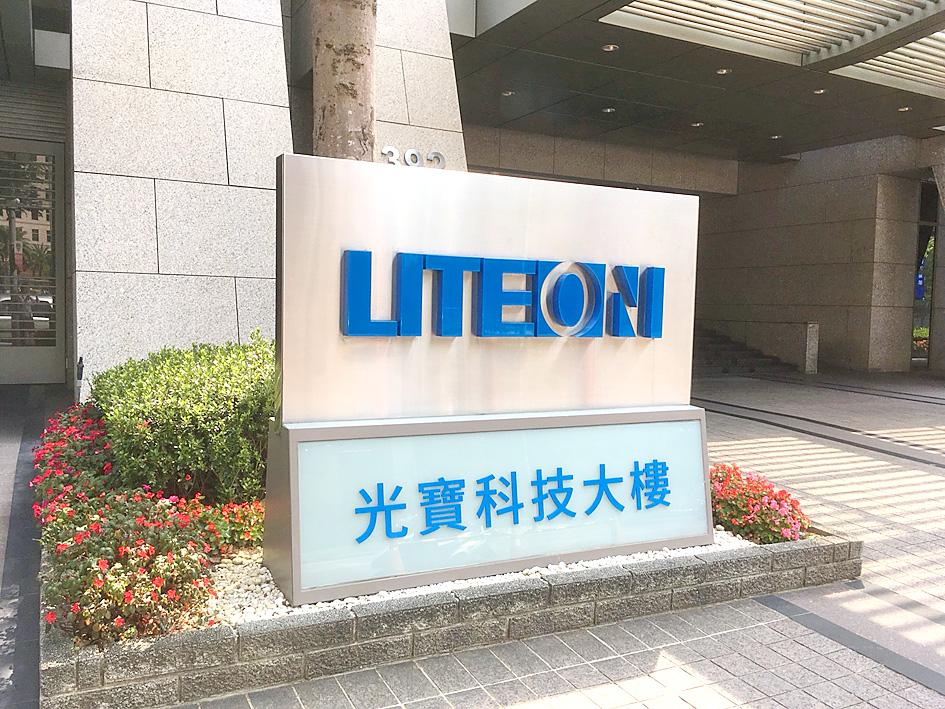Electronic components supplier Lite-On Technology Corp (光寶科技) yesterday said it expects revenue to grow at a quarterly pace of 10 percent this quarter, thanks to shipment delays of some automotive devices, computers and consumer electronics due to key component shortages.
The company’s revenue last quarter grew to NT$41.86 billion (US$1.49 billion) — its highest level in about seven quarters.
“The fourth quarter is normally an off-season ... but the third quarter [revenue] was affected by component and material shortages. We believe it should be okay to [expect] 10 percent revenue growth in the fourth quarter,” Lite-On president Anson Chiu (邱森彬) told investors in an online conference yesterday.

Photo: Chen Rou-chen, Taipei Times
The company was concerned about the chip shortage, but it altered its product designs at the beginning of this year to minimize the impact, Chiu said, adding that China’s electricity curbs have had a very limited effect on Lite-On as it has expanded capacity in Taiwan, Thailand and Vietnam.
Automotive electronics and cloud-based and artificial intelligence of things (AIoT) devices, both of which deliver a higher gross margin than the corporate average, would be the main growth drivers this quarter, extending last quarter’s robust growth momentum, he said.
The company also maintains an optimistic outlook for next year as its optoelectronics business is expected to grow 15 to 20 percent year-on-year, Chiu said.
Lite-On’s optoelectronics business, which offers outdoor lighting, automotive electronics and optoelectronic product solutions, contributed 20 percent to its revenue last quarter.
Its cloud and AIoT business made up 28 percent of the company’s revenue, with products including electronic components used in data centers, servers and smart devices.
Electronic components for information technology and consumer electronics products such as notebook computers and game consoles were the biggest source of revenue, making up about 52 percent, the company said.
Lite-On yesterday reported that net profit grew 3 percent to NT$3.08 billion last quarter from NT$2.99 billion a year earlier, thanks to robust demand for power units used in cloud computing devices, electric vehicles and PCs.
That represented a quarterly decline of 24 percent from NT$4.03 billion, after some impairment losses were booked.
Earnings per share rose to NT$1.33 last quarter from NT$1.29 a year earlier, but dropped from NT$1.74 in the second quarter.
Gross margin rose to 19.3 percent last quarter from 19 percent a year earlier, but declined from 19.7 percent in the second quarter.

Three experts in the high technology industry have said that US President Donald Trump’s pledge to impose higher tariffs on Taiwanese semiconductors is part of an effort to force Taiwan Semiconductor Manufacturing Co (TSMC, 台積電) to the negotiating table. In a speech to Republicans on Jan. 27, Trump said he intends to impose tariffs on Taiwan to bring chip production to the US. “The incentive is going to be they’re not going to want to pay a 25, 50 or even a 100 percent tax,” he said. Darson Chiu (邱達生), an economics professor at Taichung-based Tunghai University and director-general of

Hon Hai Precision Industry Co (鴻海精密) is reportedly making another pass at Nissan Motor Co, as the Japanese automaker's tie-up with Honda Motor Co falls apart. Nissan shares rose as much as 6 percent after Taiwan’s Central News Agency reported that Hon Hai chairman Young Liu (劉揚偉) instructed former Nissan executive Jun Seki to connect with French carmaker Renault SA, which holds about 36 percent of Nissan’s stock. Hon Hai, the Taiwanese iPhone-maker also known as Foxconn Technology Group (富士康科技集團), was exploring an investment or buyout of Nissan last year, but backed off in December after the Japanese carmaker penned a deal

WASHINGTON POLICY: Tariffs of 10 percent or more and other new costs are tipped to hit shipments of small parcels, cutting export growth by 1.3 percentage points The decision by US President Donald Trump to ban Chinese companies from using a US tariff loophole would hit tens of billions of dollars of trade and reduce China’s economic growth this year, according to new estimates by economists at Nomura Holdings Inc. According to Nomura’s estimates, last year companies such as Shein (希音) and PDD Holdings Inc’s (拼多多控股) Temu shipped US$46 billion of small parcels to the US to take advantage of the rule that allows items with a declared value under US$800 to enter the US tariff-free. Tariffs of 10 percent or more and other new costs would slash such

SENSOR BUSINESS: The Taiwanese company said that a public tender offer would begin on May 7 through its wholly owned subsidiary Yageo Electronics Japan Yageo Corp (國巨), one of the world’s top three suppliers of passive components, yesterday said it is to launch a tender offer to fully acquire Japan’s Shibaura Electronics Co for up to ¥65.57 billion (US$429.37 million), with an aim to expand its sensor business. The tender offer would be a crucial step for the company to expand its sensor business, Yageo said. Shibaura Electronics is the world’s largest supplier of thermistors, with a market share of 13 percent, research conducted in 2022 by the Japanese firm showed. If a deal goes ahead, it would be the second acquisition of a sensor business since